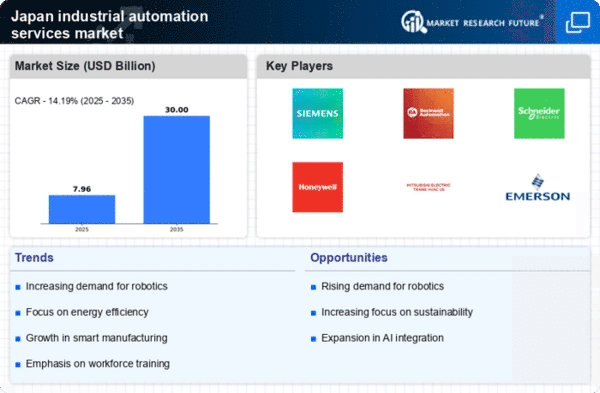Aging Workforce
The aging workforce in Japan presents both challenges and opportunities for the industrial automation-services market. With a significant portion of the population nearing retirement age, industries face a shortage of skilled labor. This demographic shift is prompting companies to invest in automation to compensate for the declining workforce. It is estimated that by 2030, nearly 30% of the workforce in manufacturing will be over 60 years old. As a result, businesses are increasingly turning to automation services to ensure operational continuity and efficiency. This driver underscores the urgency for industries to embrace automation as a viable solution to address labor shortages and maintain productivity.
Rising Labor Costs
The industrial automation-services market in Japan is experiencing a notable shift due to rising labor costs. As wages increase, manufacturers are compelled to seek automation solutions to maintain competitiveness. The average wage in the manufacturing sector has risen by approximately 3.5% annually. This increase is prompting companies to invest in automation technologies. This trend is particularly evident in sectors such as automotive and electronics, where labor-intensive processes are being replaced by automated systems. Consequently, the demand for automation services is expected to grow, as businesses aim to optimize operations and reduce reliance on manual labor. This driver highlights the necessity for companies to adapt to economic pressures while enhancing productivity through automation.
Technological Advancements
Technological advancements play a crucial role in shaping the industrial automation-services market in Japan. Innovations in robotics, artificial intelligence, and the Internet of Things (IoT) are driving the adoption of automation solutions across various industries. For instance, the integration of AI in manufacturing processes has been shown to improve efficiency by up to 20%. Furthermore, the development of smart factories, characterized by interconnected devices and real-time data analytics, is revolutionizing production capabilities. As these technologies continue to evolve, they create new opportunities for service providers in the automation sector, enabling them to offer more sophisticated solutions tailored to the needs of Japanese manufacturers.
Government Initiatives and Support
Government initiatives and support are significantly influencing the industrial automation-services market in Japan. The Japanese government has launched various programs aimed at promoting automation and digital transformation within the manufacturing sector. For example, the 'Society 5.0' initiative encourages the integration of advanced technologies to enhance productivity and innovation. Additionally, financial incentives and subsidies are available for companies investing in automation technologies, which can cover up to 50% of the costs. This supportive environment fosters growth in the industrial automation-services market, as businesses are more likely to adopt automation solutions when backed by government resources and encouragement.
Increased Focus on Quality and Precision
Increased focus on quality and precision is driving the industrial automation-services market in Japan. As competition intensifies, manufacturers are compelled to enhance product quality and reduce defects. Automation technologies, such as precision robotics and advanced quality control systems, enable companies to achieve higher standards in production. Reports indicate that automated processes can reduce defect rates by up to 50%, making them an attractive option for manufacturers. This emphasis on quality not only improves customer satisfaction but also strengthens brand reputation. Consequently, the demand for automation services that ensure precision and reliability is likely to rise, further propelling growth in the industrial automation-services market.

















